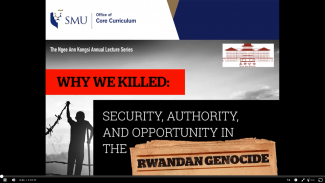
“The conventional wisdom is that anyone, when faced with extraordinary circumstances, is capable of extraordinary action, including extraordinary violence, or genocidal violence. What I am hoping to do today is to convince you that the answer is much more complex than what this truism might suggest,” said Prof Omar McDoom from the London School of Economics and Political Science. He was speaking at the Ngee Ann Kongsi Annual Lecture Series, which was hosted virtually by Singapore Management University (SMU) on 10 September 2021.
The session was attended by more than 1,000 guests comprising students, faculty, staff, alumni and members of the public. Organised by SMU’s Office of Core Curriculum and Wee Kim Wee Centre, the Lecture formed part of a student module titled “Big Questions”. “Big Questions” addresses a major challenge that humanity faces, broadly defined as a thesis and its (seeming) antithesis, and is part of SMU’s Core Curriculum for undergraduates.
The Core Curriculum is SMU’s distinctive take on what students should have foundationally in their education. Standing on three pillars of learning, or three inter-related paths of development (Capabilities, Communities, and Civilisations), the Core Curriculum aims to nurture a generation of competent, adaptable, and responsible decision-makers who can apply themselves nimbly to all facets of life and work.
“Genocide is different because the decision is made [by the regime] that the regime no longer wishes to communicate with a group, to relate to a group or to control a group. They wish the relationship to end altogether. That is what makes genocide a distinctive choice, and analytically and conceptually different from other forms of atrocities. This is exactly what a small group of extremists chose in Rwanda in April 1994,” said Prof McDoom.
A comparative political scientist and Associate Professor in the Department of Government at the London School of Economics and Political Science, Prof McDoom’s research interests lie in the study of peace, security, development, ethnicity, and kleptocracy. He specialises in the study of conflicts and violence framed along ethnic and religious boundaries, and in strategies that promote co-existence and cooperation between social groups in plural societies.
“Rwanda’s extraordinary violence changed our world in several important ways. It lent momentum to the movement to the creation of the international criminal court and it also focused the world’s attention on the scourge of central violence in war,” commented Prof McDoom.
Sharing some of the key findings from his new book on genocide, “The Path to Genocide in Rwanda: Security, Opportunity, and Authority in an Ethnocratic State” at the Lecture, Prof McDoom presented a rigorous and comprehensive explanation of how and why the Rwanda genocide occurred, and how and why people participated in it. The book drew on interviews with several hundred Rwandans, comparing those who participated in the violence and those who did not or, who did so at different times.
In his concluding thoughts, Prof McDoom shared the theories borne from his findings, about why some Rwandans killed and why some did not. Urging members of the audience to rethink social capital, he highlighted that its dark side might bind terrorists or attack groups for pernicious purposes. The scale of civilian participation in the Rwanda genocide also showed that social forces of influence such as conformity and coercion are amplified within the network mechanisms of a highly rural and agrarian country. Besides dispositional forces, it was very much a complex combination of situational forces and relational forces coming into play.